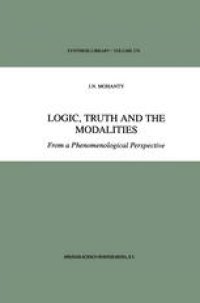
Ebook: Logic, Truth and the Modalities: From a Phenomenological Perspective
Author: J. N. Mohanty (auth.)
- Tags: Logic, Phenomenology, Epistemology
- Series: Synthese Library 278
- Year: 1999
- Publisher: Springer Netherlands
- Edition: 1
- Language: English
- pdf
This volume is a collection of my essays on philosophy of logic from a phenomenological perspective. They deal with the four kinds of logic I have been concerned with: formal logic, transcendental logic, speculative logic and hermeneutic logic. Of these, only one, the essay on Hegel, touches upon 'speculative logic', and two, those on Heidegger and Konig, are concerned with hermeneutic logic. The rest have to do with Husser! and Kant. I have not tried to show that the four logics are compatible. I believe, they are--once they are given a phenomenological underpinning. The original plan of writing an Introduction in which the issues would have to be formulated, developed and brought together, was abandoned in favor of writing an Introductory Essay on the 'origin'- in the phenomenological sense -of logic. J.N.M. Philadelphia INTRODUCTION: THE ORIGIN OF LOGIC The question of the origin of logic may pertain to historical origin (When did it all begin? Who founded the science of logic?), psychological origin (When, in the course of its mental development, does the child learn logical operations?), cultural origin (What cultural - theological, metaphysical and linguisti- conditions make such a discipline as logic possible?), or transcendental constitutive origin (What sorts of acts and/or practices make logic possible?).
The essays in this volume develop the ideas of Kant, Hegel and Husserl, leading to an explication of the fundamental concepts of logic - the concepts of `judgment', `truth' and the modalities. It is a book on philosophy of logic, spanning the gap between Kant and Hegel on the one hand, and Husserl, Frege and Lask on the other, mediated by such thinkers as Heidegger and König.
With the rejection of psychologism, logic is to be construed as concerned with meanings, meanings are to be tied nevertheless to intentional acts of thinking, truth becomes a coherence-theoretical reconstruction of correspondence and, in their origin, modalities are connected to the horizontal character of experience. At one end, logic develops, through formal and transcendental logics, to speculative logic. At the other end, pursuing the practical roots of thinking, it becomes hermeneutic logic. Then we begin to see the nature of logic as a whole.
Audience::Philosophers and logicians, both graduate and post-graduate.